Innovation Project Update
Presentation
My Innovation Plan: Implementing ePortfolios in Elementary Education
The implementation of ePortfolios
in my educational setting aims to
enhance student engagement,
goal-setting, and self-reflection
while transitioning from traditional
physical binders to dynamic digital
portfolios. This initiative fosters
authentic learning experiences by
allowing students to document their progress, showcase their achievements, and connect their learning to real-world applications. Grounded in my literature review, this project addresses the limitations of traditional assessment by promoting student agency and voice, as emphasized in the COVA model.
Providing students with the opportunity to actively participate in documenting and presenting their learning speaks directly to the first element of the COVA framework—Choice. When students are given the freedom to decide how they want to organize, structure, and share their learning journey, they begin to take greater ownership of their education (Harapnuik, 2018). This personalization not only increases engagement but also supports the development of a growth mindset as learners reflect on progress and take initiative in setting and pursuing goals.
This innovation aligns closely with Fink’s 3 Column Table, ensuring that learning goals, in-class activities, and assessments are meaningfully connected. Through ePortfolios, students engage in self-reflection, make interdisciplinary connections, and build personal relevance into their learning—all essential components of significant learning experiences.
Ultimately, this innovation plan supports the Action Research Question: How does implementing ePortfolios impact student engagement, goal-setting, self-reflection, and real-world learning connections compared to traditional binders?
By giving students the tools and autonomy to track their own growth in a digital format, this project not only enhances learning outcomes but also prepares students for lifelong learning in an increasingly digital world.

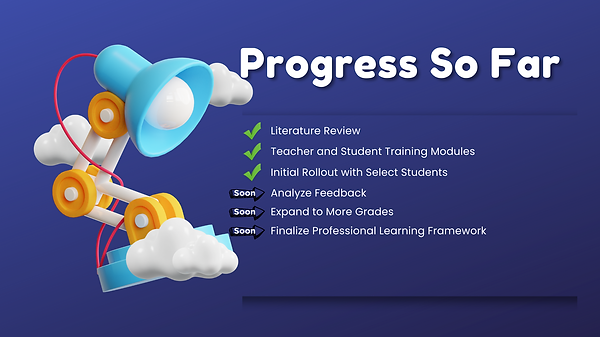
Where I Am Now
I have completed key components of my innovation plan, including:
-
Literature review & research supporting ePortfolios’ impact on student engagement
-
Teacher and student modules on how to effectively use ePortfolios
-
Initial implementation with select students
My action research design and literature review, continues to guide the process, focusing on how ePortfolios enhance student ownership and transform assessment practices. The project is also structured using the 4DX (Four Disciplines of Execution) framework:
-
WIG (Wildly Important Goal): Increase student agency and meaningful reflection through ePortfolios
-
Lead Measures: Teacher training sessions, student onboarding, and ePortfolio check-ins
-
Lag Measures: Student feedback, depth of reflection, and engagement indicators
-
Scoreboard: Tracking student entries, goal-setting habits, and teacher implementation data
Key Reflections on the Learning Process


What Worked Well? (per student/teacher surveys and observations)
-
Student Ownership: Increased engagement and earners embraced the ability to curate their work and reflect on progress.
-
Scalability: The project has the potential to expand across multiple grades with proper training and support.
What Could Be Improved? (per student/teacher surveys and observations)
-
More Structured Rollout: Some students struggled with getting started due to the learning curve of digital tools.
-
Clearer Guidelines: Refining expectations and rubrics for portfolio quality and depth of reflection.
-
More Frequent Check-ins: Scheduling regular feedback loops to support students and teachers.
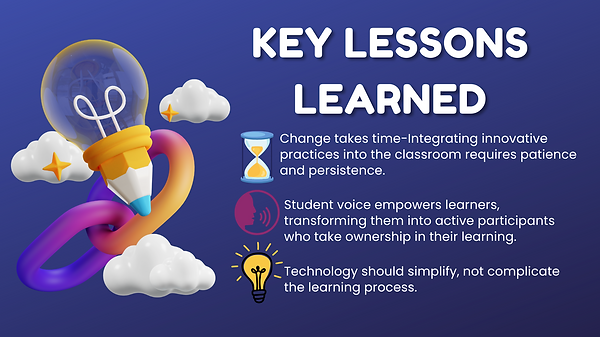
Lessons Learned
-
Change Requires Patience: Some educators needed more time to adjust to digital tools.
-
Student-Led Learning is Powerful: Giving students choice and voice increased motivation and effort.
-
Technology Should Support, Not Distract: Simplifying tools and ensuring accessibility is critical.
-
Growth Mindset Matters: Encouraging perseverance and flexibility among both students and teachers made a noticeable impact during early implementation phases.
Promoting & Communicating My Innovation Project
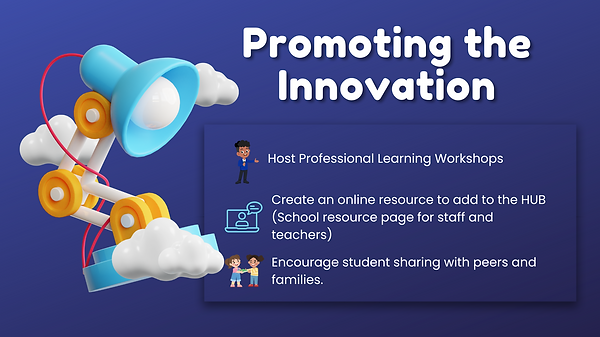
To gain broader adoption, I plan to:
-
Host professional learning workshops for educators
-
Create an online resource hub with tutorials and best practices
-
Present findings at educational conferences to showcase success stories
-
Encourage students to share their portfolios with parents and peers
My professional learning call to action includes empowering educators to embrace student-centered assessment models and build a collaborative culture of reflection, digital literacy, and continuous growth. By equipping teachers with both the mindset and tools to implement ePortfolios, we can foster more authentic, personalized learning experiences for every student.
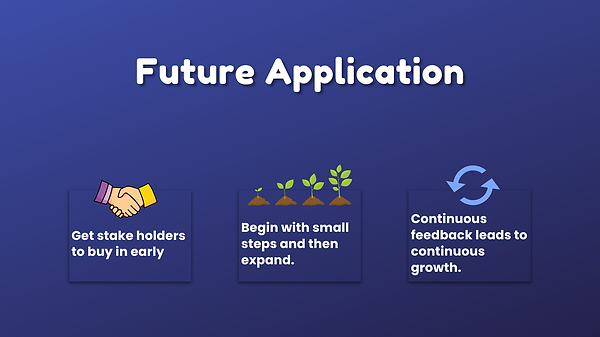
Looking Ahead: Applying Lessons to Future Innovation Projects
-
Prioritize Stakeholder Buy-in Early: Having those crucial conversations in engaging teachers and administrators at the start can streamline implementation.
-
Pilot with a Smaller, More Controlled Group First: Testing ideas with a manageable group before scaling up ensures smoother transitions.
-
Gather Feedback Continuously: Creating a culture of ongoing reflection and improvement makes innovation more sustainable.
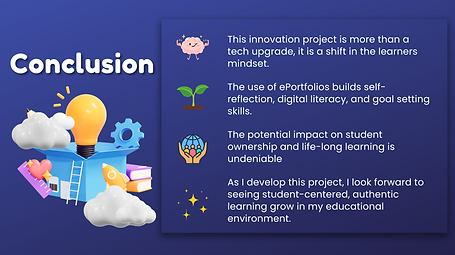
This innovation project is more than just a digital shift—it’s a pedagogical transformation and a shift in the learner’s mindset. The use of ePortfolios is preparing students with essential skills in self-reflection, digital literacy, and goal-setting. While challenges remain, the potential impact on student ownership and lifelong learning is undeniable.
Backed by research, guided by strategic frameworks like 4DX and Fink’s 3 Column Table, and grounded in the principles of COVA, this project lays the foundation for meaningful change. As I continue refining and expanding this initiative, I am excited to see how student-centered, authentic learning will evolve in my educational environment.
_____________________________________________________________________________________________________________________________
References:
Dweck, C. S. (2006). Mindset: The new psychology of success. Random House.
ePortfolios Explained: Theory and Practice. Centre for Teaching Excellence, University of Waterloo.
Harapnuik, D. (2017). CSLE + COVA. https://www.harapnuik.org/?page_id=6988
Harapnuik, D. (2018). It's about learning. https://www.harapnuik.org/?page_id=6991.
Harapnuik, D., & Thibodeaux, T. (2023). COVA: Inspire learning through choice, ownership, voice, and authentic experiences (2nd ed).
Perkins, Peggy G. (2012) Portfolio assessment in an elementary school: A model to facilitate preparation, International.




